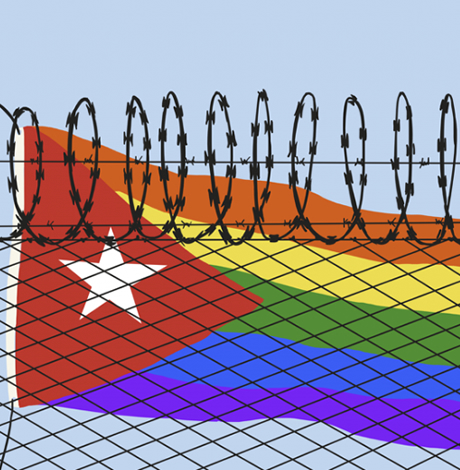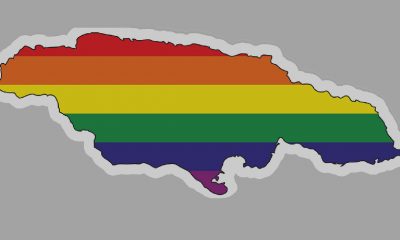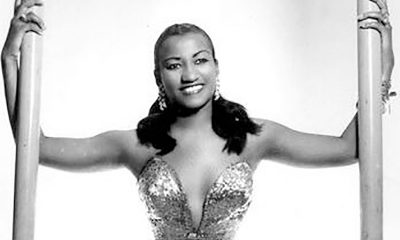Opinions
Tremenda Nota, yet another publication you can’t read in Cuba
Blade media partner’s website remains blocked in Communist country


Editor’s note: Tremenda Nota is the Washington Blade’s media partner in Cuba. This article was published on Tremenda Nota’s website on Sept. 16.
Just over a year after its founding in December 2017, Tremenda Nota was censored in Cuba. Our website was blocked in February of this year on the eve of a national referendum to ratify a new Cuban constitution.
During the referendum process, the Cuban Parliament considered the establishment of marriage equality for same-sex couples, but later decided to postpone such a change. Tremenda Nota is Cuba’s leading publication focused on the LGBTI+ community and produced original reporting and commentary on the subject.
Our censorship, still in effect today, was imposed after we published an article revealing a national survey conducted by the Cuban government in 2016. The survey’s results showed popular opinion supports equal rights for LGBTI+ people, contradicting the Parliament’s professed rationale for postponing marriage equality.
Tremenda Nota is the first Cuban digital magazine that covers stories exclusively about women, the LGBTI+ community, the black community, migrants and discrimination. Attacks on our journalists effectively silence these groups.
Since its founding, our reporters, editors, and collaborators have suffered harassment by the Cuban State Security apparatus. Members of our team have been arrested, interrogated, and threatened. In some cases, police officers have destroyed our work product and have confiscated our equipment.
The increasing attacks on our team since mid-2018 have driven at least seven of our journalists to leave Cuba, relocating temporarily or permanently to other countries. The pressure we face grew in May 2019 after a team of our journalists covered an independently-organized LGBTI+ march in Havana. (In Cuba, only political actions organized by the government are permitted.)
One of the seven, photojournalist Yariel Valdés González, has been detained in the U.S. since March 2019, when he presented himself at the border and requested political asylum.
Valdés was cited and threatened by Cuban State Security at least three times in his final six months in Cuba for his work with Tremenda Nota and with the Washington Blade, our media partner in the U.S. He was also denied permission to travel outside the country. He was able to leave Cuba only after promising two State Security officers that he would not return.
Although Valdés has clear evidence of the persecution he suffered in Cuba, U.S. immigration authorities have unjustifiably delayed the granting of his asylum petition. He will appear before a judge for the third time on Sept. 18.
Tremenda Nota is profoundly troubled that a journalist with Valdés’ history, after requesting asylum due to persecution suffered in the course of his work, has been deprived of liberty for more than five months.
Other effects of persecution are psychological. At least two reporters and an editor for Tremenda Nota have required treatment for post-traumatic stress, a result of the arrests, interrogations, and surveillance they have faced. We have not published details of these stories to protect the privacy of the journalists affected, particularly those who continue to live in Cuba, where they face constant and ongoing pressure against independent journalism.
Such persecution is not unique to our team. On Wednesday, Sept. 11, Cubanet reporter Roberto de Jesús Quiñones Haces was imprisoned in the province of Guantánamo, making him the first journalist in recent years to be indicted and prosecuted for his work. With no guarantee of a fair trial, Quiñones was condemned to a year of prison and “correctional labor” for the crime of “contempt,” a penal concept often used against civil activists and political dissidents.
This imprisonment represents a turning point in the government’s attitude toward independent journalism. Since Cuba’s Black Spring of 2003, the arbitrary detentions of independent reporters have been limited to relatively brief periods.
The prosecution of Quiñones, together with official warnings to other journalists to cease their work, highlights the danger of reporting in Cuba for any independent journalist.
Based on its duration and extent, the harassment against Tremenda Nota appears to be a concerted strategy to destroy our publication. Similar systematic attacks have been directed against other independent media publications.
In the case of a magazine for women, the Black community, and the LGBTI+ community, the government’s strategy can only exacerbate the disadvantages suffered by these marginalized groups, denying their freedom of expression and free access to information.
This policy contradicts the official discourse about the construction of an inclusive country. It robs the debate of diverse voices the government itself has committed to support, only because they speak from a platform beyond the authorities’ control.
The actions of the government against Tremenda Nota is inescapably connected with homophobia, transphobia and the patriarchal tone of the Cuban Revolution.
Even while there is no guarantee of the free exercise of independent journalism in Cuba, Tremenda Nota will continue writing and filming the stories of women, LGBTI+ people, migrants, the black community and other groups who are marginalized by the prevailing discourse, by history, or by power.
Opinions
Why innovation matters for Black health
Making healthcare more affordable is vitally important

Black Americans are more likely than Americans of other races to live with chronic conditions like HIV. They also disproportionately struggle to afford the often expensive treatments needed to manage those conditions.
So it’s hardly surprising that Black voters care about politicians’ proposals to bring down healthcare costs more than any other group.
Most of those proposals — from leaders in both parties — are well-intentioned. But they are not all equally beneficial. Recent efforts to impose price controls on prescription drugs threaten to harm the very patients they are meant to help.
Consider former President Biden’s signature Inflation Reduction Act, which gave Medicare the power to set prices on brand-name medicines for chronic conditions like diabetes, autoimmune disease, or cancer — all diseases that Black patients disproportionately struggle with.
These price controls promise short-term cost savings. But they threaten to erase the much larger savings that patients with chronic illness would otherwise see over their lifetimes. That’s because price controls disincentivize companies from developing new medicines to compete against existing popular treatments for serious conditions.
Consider HIV. According to the CDC, more than 1.2 million people in the United States are living with HIV, and roughly 31,000 new infections still occur each year. In the 1980s, these diagnoses would have been a death sentence. Today, they represent a manageable chronic illness — a direct result of decades of sustained research and investment in antiretroviral development, long-acting injectables, and prevention tools like PrEP.
HIV treatments are cheaper and more accessible now than ever. That’s not because of government intervention, but because of the price wars that resulted as companies introduced competing therapies and battled for market share.
In fact, had the government prematurely intervened, those competing treatments might never have reached patients, who would still be stuck paying vastly higher prices.
That is precisely the risk our leaders are now taking. Many companies are already scaling back research because of the IRA’s price controls. Since the law’s passage in 2022, biotech firms have canceled at least 55 research programs.
That is especially dangerous for the Black community. Black patients have historically been overlooked by the research establishment, from the underrepresentation of Black participants in clinical trials to underinvestment in conditions like sickle cell disease that disproportionately affect Black patients. If companies are forced to scale back research, it is likely that treatments for smaller and more marginalized patient populations will face the greatest risks of being cut.
The Trump administration, meanwhile, continues to push for its so-called “Most Favored Nation” policy that would tie U.S. drug prices to the lower prices arbitrarily set by foreign governments.
The consequences could be severe. “Most Favored Nation” pricing would dramatically reduce companies’ revenues on both new and existing medicines, decimating resources for future research and development. Researchers project that, if imposed on Medicare and Medicaid alone, such policies could cut research spending nearly in half, leading to more than 200 fewer new medicines over the coming decade.
Developing treatments for HIV has historically required long timelines, complex trials, and sustained capital. Any policy that compresses revenues for breakthrough medicines must be evaluated not only for short-term savings, but also on its potential long-term effects on the pipeline that brings new survival and prevention advances to patients.
And there are also access risks. In countries that rely heavily on price controls, patients often face delayed and restricted access to drugs. Black communities in the United States already face barriers to consistent care and adherence to treatment. Importing foreign countries’ price controls would inevitably have ripple effects across our healthcare system, worsening these disparities.
Making healthcare more affordable is vitally important. Black families feel the pressure of rising costs every single day. But price controls carry severe tradeoffs. Breakthroughs in HIV treatment, long-acting prevention, cancer treatment, and chronic disease management rely on steady research — and if policymakers weaken the economic engine that drives that research, Black patients will feel the consequences first.
Health equity is not just about lowering today’s price tag. It is also about protecting tomorrow’s cures. Black communities deserve reforms that do both, not price controls that promise cost relief while sacrificing future breakthroughs.
Guy Anthony is president and CEO of Black, Gifted & Whole.

Republican representatives in the Kansas Legislature recently passed a bill that bans people from using restrooms in government buildings that do not align with their sex assigned at birth. The bills SB 224 and HB2426 initially focused on rewriting legislation surrounding driver’s licenses but after amendments, the bill would not only stop trans people from updating their gender on these driver’s licenses but force people to surrender their existing licenses. These bills also carry the most severe anti-trans bathrooms ban of any state.
According to Erin Reed for Erin In The Morning (EITM), “the measures would now even empower private citizens to act as bounty hunters — entering private business to search for transgender people in bathrooms and sue them for alleged violations.”
The bills would allow anyone to report any people who utilize any bathrooms that do not align with their gender assigned at birth. Anyone who believes that someone has entered a restroom not in alignment with their gender assigned at birth can complain and pursue $1,000 in damages. The first time that someone complains about a person using the “wrong” bathroom, that person can face a written warning for their first violation. The second violation would require them to pay a $1,000 fine, and with each additional violation, they could receive a misdemeanor resulting in another fine or up to six months in jail.
The Kansas Attorney General’s office is then responsible for determining whether the person has to pay the fine. Allowing people to police bathroom spaces is reminiscent of Florida’s bathroom law that allows transgender people to face criminal penalties, but even more dangerous, the bills extend this enforcement from “government-owned buildings” to private spaces.
Government entities that manage bathrooms and locker rooms at public schools and universities, highway rest areas, and public parks are now required to assign a gender designation to multi-occupancy private facilities or face a $25,000 fine for the first violation and a $125,000 fine for any additional violations.
There is a section, Reed notes, that creates a “private right of action,” making it the first law to penalize trans people directly for using the restroom and would extend bathroom bans into private spaces. “Without the option of single-person or family alternatives, this essentially forces trans people out of public life by denying us the right to even relieve ourselves or wash up,” Isaac Johnson of Trans Lawrence Coalition told EITM.
“Denying access to basic public amenities doesn’t just inconvenience people; it relegates them to second class citizenship,” Allison Chapman of Lawyers for Good Government told EITM.
The legislation flew through the Kansas Congress (and by using procedural maneuvers, Republican lawmakers ensured that there was no public input on the bill). The bill is now heading to the Kansas Gov. Laura Kelly’s desk for signature. Thankfully, Kelly, a Democrat who has consistently vetoed anti-trans legislation, vetoed it, but even so, it could be passed if Kansas Republicans get the support of two-thirds of lawmakers in both chambers.
The quick passage of these bills, and using the “gut-and-go” measure to ensure people had no opportunity to provide feedback after the bathroom elements were added, has drawn swift criticism.
The bills themselves have deeply unsettling historical parallels to slave catcher laws that allowed “bounty hunters” to track down and return escaped enslaved individuals to their enslavers for a cash reward. Federal laws, like the Fugitive Slave Acts of 1793 and 1850, enabled “bounty hunters” to operate even in free Northern states. These “bounty hunters,” also known as “slave catchers” or “kidnapping clubs” frequently kidnapped free Black people and sold them back into slavery, in what has been called the “Reverse Underground Railroad.”
Both of these acts provided little to no protection to free Black Americans; in fact, these acts aided and abetted this violence by incentivizing the kidnapping and sale of people of color into slavery. Even if free people had official “freedom papers,” many kidnappers destroyed these documents, and even free people of color typically could not testify in court. Free and previously enslaved Black children who had escaped to the North were especially vulnerable to “slave catchers” because they often did not know how to assert their rights.
In fact, ICE’s kidnapping of five-year-old Liam Conejo Ramos echoes this long history of child snatching in the U.S., from bounty hunters capturing and selling Black children into slavery.
This legislation also reeks of Texas Senate Bill 8 (SB 8), enacted in September 2021, that allowed private citizens to sue anyone who aids or performs an abortion after the detection of a fetal heartbeat, around six weeks of pregnancy. At the time, this was the most severe anti-abortion legislation on the books. It has remained there for five years, leading to a number of Rule 202 petitions that aim to collect more information that would provide a person who has violated SB 8.
Just this past month, the Texas Supreme Court heard oral arguments for Sadie Weldon v. The Lilith Fund, a case where a private Texas citizen sought to depose Neesha Davé, deputy director of the Lilith Fund, a nonprofit that supports people seeking abortions. The case will not rule on SB 8’s constitutionality but would open a path to challenge the law.
Bathrooms have long been a battleground to police people’s bodies, and this new Kansas soon-to-be law is no different. Think of segregation in the Jim Crow South between the 1890s and the mid-1960s when some White people acted as vigilantes ensuring that Black people remained out of “white-only” restrooms and other “white-only” spaces.
Just as Rep. Susan Hemphries, a Wichita-based Republican who brought the bill to the House floor said that the legislation is about the privacy for and safety of women, bathroom segregation was often justified by painting Black male sexuality as a threat to white women.
This even extended to the perceived threat of Black women in white women’s restrooms, with one group of white women in Detroit going on strike to protest the order prohibiting discrimination of people working in government and defense industries. These white women argued that they would contract syphilis from sharing toilet seats with Black women.
These new bills and all other anti-trans bathroom legislation, as many have argued, are the continuation of these racist bathroom restrictions.
There is deep historical precedence not only for policing public (and private) bathroom access but also enabling private citizens to act as bounty hunters. This form of bounty hunting threatens not just trans women but all women who anyone does not “assume” is cisgender who may be subject to legal complaints. As Orien Rummler reported for the 19th and them, anti-trans legislation and rulings threaten the rights of all women, especially cis women of color. And as science has long proved, gender is not binary–so it raises the question of how intersex people will be policed in these restrooms.
And by commodifying the bounty, it emboldens anti-trans violence, and misogynistic violence writ large, in the most intimate of public and private spaces.
Emma Cieslik is a museum worker and public historian.
Opinions
Criteria for supporting a candidate in D.C.
We deserve statehood and mayoral control of our National Guard

Choosing a candidate to support for office in D.C. is a little different than choosing one in other places. As everyone knows, D.C. isn’t a state; though apparently not everyone understands what that means.
D.C. was granted home rule in 1974, but the legislation gave us only partial control of our government. Congress retained the right to review all legislation and budgets for 30 days. During that time, it can reject legislation fully or just make changes. Recently, Congress has used that power to turn down legislation when the Council revised our criminal code and screwed with legislation regarding how we tax our own residents. Congress has messed with our budgets as well. We saw what happened when the felon in the White House took control of the MPD for 30 days, allowed under the home rule legislation, and how he has full control over the D.C. National Guard and the implications that has had.
We have no representation in Congress, just a delegate. That person has been given a vote in committees when Democrats controlled the House, but even then, no vote in the full House. That all has severe implications for our elected officials. They must be aware of these things when they speak out, and when they propose and pass legislation. I personally saw that close up when we fought for marriage equality in the District. Those of us leading the charge worked with the Council on legislation to first recognize gay marriages from other states. Only after that legislation went through the review period without being stopped did the Council move to pass marriage equality in the District. Then we held our breath for the 30-day review period. There have been other instances where Congress stopped crucial legislation and put amendments onto our bills, like stopping us from spending certain money on needle exchange during the height of the AIDS crisis and stopping us from spending federal money on abortions.
So, when deciding who to support I want to be sure a candidate understands the implications if they attack Congress and the president, especially when Republicans are in charge. The fact is we have been screwed even by some Democrats. In today’s world, until we get rid of the felon, and Democrats take back both houses of Congress, all of our elected officials, but particularly our mayor, will be walking a tightrope. Beating your chest and attacking what they are doing is not the way to go. Again, we are not in the same position as cities like Portland, Minneapolis, or LA. We saw that again when the courts said the National Guard had to leave those cities, the president couldn’t send them in, but D.C. was exempt from that decision because he can send them here. The president, not the mayor, controls the National Guard in D.C.
Once I am comfortable a candidate understands all that, my criteria for supporting them of course includes many other things. I am a liberal, born in New York City. I taught public school in Harlem and was a member of the teacher’s union. Then went to work for progressive Congresswoman Bella S. Abzug (D-N.Y.). After that, I served as Coordinator of Local Government for the City of New York, during the time of the financial control board there. Then came to D.C. in 1978 to work for the Carter administration. I have been an activist all my life in the areas of civil rights, women’s rights, disability rights, and finally LGBTQ rights. I am a community and Democratic activist. All this impacts my decisions regarding candidates. I want to hear consistency from them. I don’t have a problem with people changing their mind on issues based on principle but do have a problem when it seems like they do so based on which way the wind is blowing. Like those who screamed ‘Defund the Police’ until the community they thought wanted to hear that in D.C. actually told them they wanted more police, not less. They simply wanted them better trained, held more accountable, and more community oriented.
I want a candidate to support statehood for D.C., but while fighting for that, they should speak out for budget and legislative autonomy. They must support mayoral control of the DC National Guard, and a full 4,000 member, well trained, MPD. They must understand how MPD works with federal law enforcement like the FBI, park police, capitol police, and the secret service. They need to reject working with ICE. They need to support more affordable housing, but not city owned housing, which has proven to be a failed experiment. They need to pledge to work to end homelessness providing decent, and available, shelters around the city for both individuals, and families in need. I want a strong education Mayor who supports teachers, and works to expand accountability for charter schools, holding them to the same standards as the public schools. We must have strong programs for both college bound students, and those who want another path, including internships and apprenticeships. Strong support for UDC, healthcare both affordable and available for all, and rental and food assistance when needed. There needs to be a strong focus on reducing the cost of childcare. A focus on the ARTS, libraries, and recreation centers, across all wards of the city. A focus on the environment, and affordable and accessible transportation. Of course, for me it’s a given they must support, and speak out, for the full panoply of rights for the LGBTQ community.
Looking at that list clearly means the city needs to raise the money to pay for all of it. Any candidate running for office who says they don’t support a strong, and vibrant, business sector, is either naïve, or just dumb, and will not have my support. A vibrant business community provides jobs, and in the long run the taxes that pay for the things we all want government to provide.
Once again D.C. is in a different place. We don’t collect taxes from those who work here but live in Maryland or Virginia. So, we have to be smart about the businesses we encourage to locate here and encourage them to hire D.C. residents, who then will pay taxes here. D.C. has developed a strong sports economy. That will be enhanced by the new RFK site, and includes the teams at the Capital Center, Audi Field, and Nats Stadium. Together they bring millions of people into D.C., who spend their money here. When groups like the Working Families Party, who suggest they are anti-business, endorse a candidate, I am wary of that candidate. We can’t be anti-business in D.C. I look at some candidates trying to replicate Mamdani’s victory in New York City by promising the moon. What they don’t seem to realize, or pretend not to, but voters must understand, is we in D.C., our Council and mayor, can’t promise what a New York City mayor does, hoping the governor and Albany, will help him out. In D.C. we don’t have an Albany to help us out. There is no governor coming to the rescue, it’s just us, and what we can negotiate with our Albany, which unfortunately consists of the president and Congress. Some may remember in 1995 we had the Control Board foisted on us. It was lucky at the time the president was a Democrat, Bill Clinton, and he named the board and chair, first Andrew Brimmer, and then the incredible Alice Rivlin. Can you imagine if Congress did that today who Trump would name to control our city?
So, we can’t only dump on them, and attack them, at least the mayor can’t, as she/he/they have to often ask them for help, and stave off their gratuitous attacks. As a columnist, and private citizen, I can attack the felon and his Republican sycophants in Congress all I want, I do and will continue to do so. But those we elect need to understand some constraint. The need to understand sometimes they are walking that tightrope when dealing with the White House and Congress.
I urge everyone to look closely at all the candidates, and then when you decide who you want, make sure you VOTE!
Peter Rosenstein is a longtime LGBTQ rights and Democratic Party activist.
-

 India5 days ago
India5 days agoActivists push for better counting of transgender Indians in 2026 Census
-

 Advice5 days ago
Advice5 days agoDry January has isolated me from my friends
-

 National5 days ago
National5 days agoAfter layoffs at Advocate, parent company acquires ‘Them’ from Conde Nast
-

 District of Columbia5 days ago
District of Columbia5 days agoCapital Pride reveals 2026 theme




















